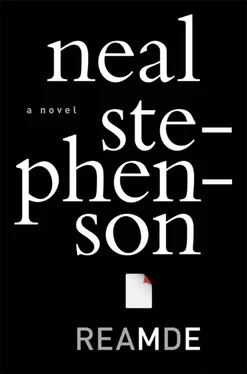“We can’t exactly break into the headquarters of the ISP and interrogate their sysadmins…” Peter said, following Csongor’s line of thought.
“But those sysadmins must have some scheme for allocating all those addresses to different parts of the city,” Csongor said. “It might not be perfect, but…”
“But it probably won’t be random, ” Peter said. “We could at least get an idea .”
It was Zula’s turn to feel like kind of a dunderhead, but working in a tech company had taught her that it was better to just come out and ask the question than to play along and pretend you understood. “How are you going to get that information?” she asked.
“Pounding the pavement,” Peter said, and looked to Csongor for confirmation.
Zula could tell from the look on Csongor’s face that he was not familiar with the idiom. “Going out on the streets,” she said, “and doing what?”
“I’ve heard they have Internet cafés all over the place there,” Peter said, “and if that’s true, we should be able to go in, pay some money, log on to a computer, and check its IP address. We write it down and move on to the next Internet café.”
“Or we could wardrive,” Csongor said.
Zula was vaguely familiar with the term: driving around with a laptop, looking for and logging on to unsecured Wi-Fi networks.
“Hotel rooms,” Peter said, nodding.
“Or just lobbies, even.”
“We could then build a map giving us a picture of how the ISP has allocated its IP addresses around the city. And that should make it possible for us to zero in on a neighborhood where the Troll lives. Maybe, if we get lucky, an Internet café that the Troll uses.”
Zula thought about it. “What I like about it,” she said, “is that it is kind of systematic and gradual, and so it should prove to our host that we are working on the problem in a steady way and getting results.”
This—keeping Ivanov happy, keeping his paranoia in check—was an aspect of the problem that Peter and Csongor had evidently not been thinking about very hard, and they gaped at her. She shook off a wave of mild irritation. “In management-speak, there are metrics that we can use to set expectations and show progress toward a goal.”
They weren’t sure whether she was joking. She wasn’t sure herself.
Why was she annoyed with them?
Because they were actually trying to solve the technical problem of locating the Troll. Which might have been Ivanov’s problem, but it wasn’t theirs. Theirs was Ivanov.
If they succeeded in finding the Troll, they’d have a worse problem: they’d be complicit in a murder plot.
But she did not make any further trouble, because there was something about their plan that she liked: it would get them out on the street, where they might be able to summon help or even escape. It was not clear to her what would happen to them if they went to the police and admitted that they had entered the country without visas, but it was unlikely to be worse than whatever Ivanov had in mind.
During this, she had been watching Sokolov from the corner of her eye. He still had a document on his lap, but he had not turned a page in a long time. He kept shushing the members of his squad, sometimes angrily. He was listening to them, trying to follow their conversation.
“Do you think they’ll allow us to go out on the street like that?”
“That’s the question,” Csongor admitted.
“They have to,” Peter said, “if they want to find the Troll.”
“Then I’ll try to sell it,” Zula said. “I’ll try to make him understand that this is the only way.” She made sure Sokolov could hear that much.
IN CSONGOR, ZULA had begun to recognize something that she had also seen in Peter and, indeed, that probably accounted for her having been attracted to Peter in the first place. Neither of these men had much in the way of formal education, since each had decided, during his late teens, to simply go out into the world and begin doing something. And each of them had found his way from there, sometimes with good and sometimes with bad results. Consequently, neither had much in the way of money or prestige. But each had a kind of confidence about him that was not often found in young men who had followed the recommended path through high school to college and postgraduate training. If she had wanted to be cruel or catty about it, Zula might have likened those meticulously groomed boys to overgrown fetuses, waiting endlessly to be born. Which was absolutely fine given that the universities were well stocked with fetal women. But perhaps because of her background in refugee camps and the premature death of her adoptive mother, she could not bring herself to be interested in those men. This quality that she had seen in Peter and now saw in Csongor was—and she flinched from the word, but there seemed little point in trying to distance herself from it through layers of self-conscious irony—masculine. And along with it came both good and bad. She saw the same quality in some of the men of her family, most notably Uncle Richard. And what she knew of him was that he was basically a good man, that he had done some crazy shit, hurt somepeople, felt bad about it, that he had gotten lucky, that he would die to protect her, and that his relations with women, overall, had not gone well.
THE PLANE DESCENDED for a while and then made a series of turns that seemed like a landing approach. In another half hour the sun would be down, but presently the light was shining almost horizontally across the landscape below them, casting distinct shadows and throwing the landforms and buildings into relief. That it was hot and humid was obvious even from up here. The physical geography was bewilderingly complicated: a lot of multipronged peninsulas groping toward a stew of large and small islands in a sprawling bay formed by the confluence of at least two major estuaries. With the exception of some silted-in bits and slabs of artificial land around the water’s edge, the landforms tended to be steep, mountainous, and green. As they descended it became easy to pick out Xiamen, which was a generally circular island, separated from the mainland by straits narrow enough that modern bridges had been thrown across, connecting it to what looked like industrial suburbs.
It was by far the largest island in the bay, with the exception of one, farther from the mainland, that rivaled it in size if not in population. For the round island of Xiamen was almost entirely developed, only the steepest bits in the interior remaining green. The big island east of it was shaped like a sponge that had been squeezed almost in half. It had some built-up areas, but they were scattered, low-lying towns separated by broad flat regions devoted to agriculture. Other parts of it were mountainous and appeared to be wilderness, albeit scarred by winding roads and speckled with curious installations, heavy on domes and antennas. “That’s the Taiwanese island, isn’t it?” Zula said.
“I would guess so,” said Csongor. “All that stuff is military; it looks like the crap that the Soviets used to build in Hungary.”
Another, smaller island passed under their wing. It too was notably underdeveloped compared to everything else. “The other one,” Csongor said. “One is Quemoy, the other is Matsu. I don’t know which is which.”
Moments later they were above Xiamen, and after another series of turns they came in for their landing.
The plane did not head for the terminal but instead taxied to a more low-slung part of the airport. This was crowded with other small private jets, and it was necessary to taxi past a score of them before finding a parking spot. Zula, of course, had no idea what Xiamen’s private jet terminal looked like on a normal day, but the scene that presented itself out the window looked extremely busy to her. Beyond the chain-link security fence, there were enough black cars jockeying for position that it was necessary for men in uniforms to stand about waving their arms and blowing whistles. Some of them were admitted onto the tarmac to pull up alongside parked jets.
Читать дальше





